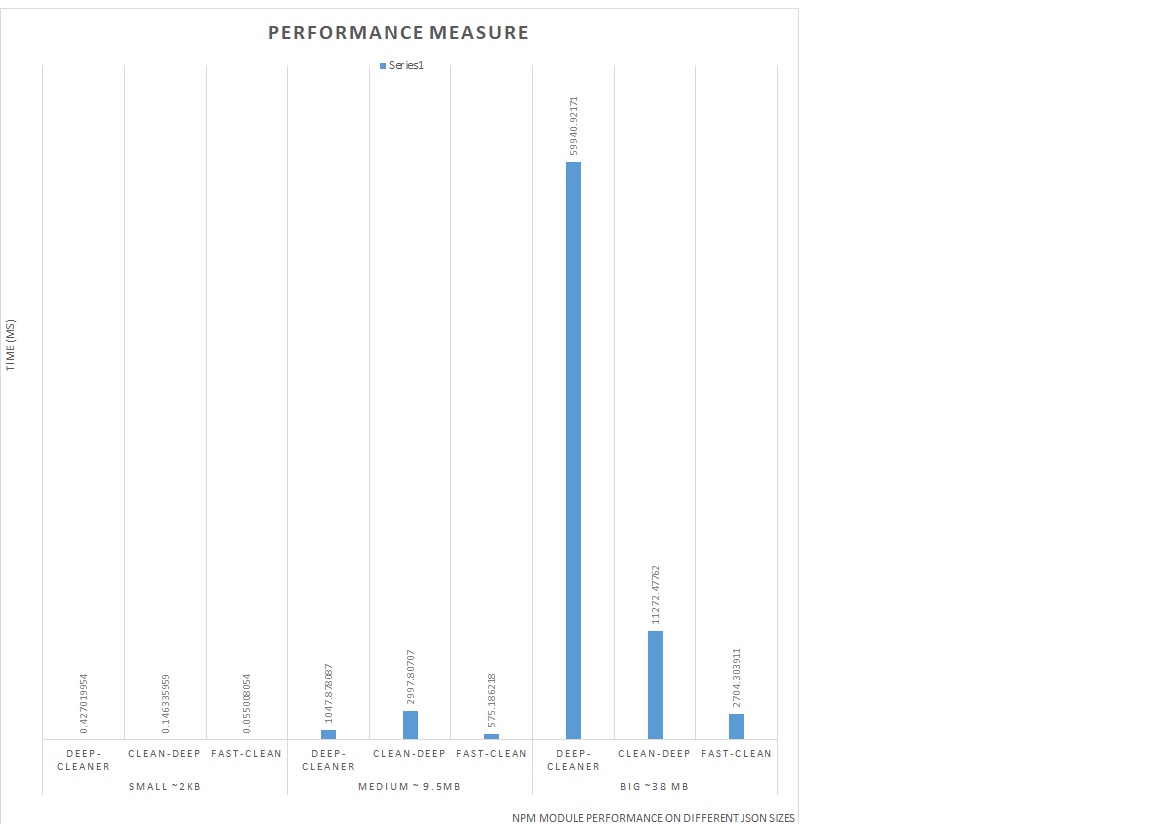@hutechwebsite/labore-deserunt-doloremque-voluptatum v1.0.0
Fast-Cleaner
Fast cleaner is an npm module designed to clean javascript objects from unwanted values like undefined, NaN, {}(empty objects) .. etc.
(now supports typescript)
What makes this module different. Check out our comparison
Update with version 1.3+
Version 1.3+ now supports cleaning objects in place. This means that the library can avoid creating new objects while cleaning. Instead it can mutate the object passed to it & clean it in place.
This will make the module not only efficient in speed, but in memory consumption as well.
While object mutation might not be a best practice in a lot of cases, in some it will be a better one if you are cleaning large objects & want to avoid huge memory consumption.
This is an OPTIONAL feature. You can simply use it by passing cleanInPlace = true in the options.
The feature is turned off by default for backwards compatibility.
All other options are supported whether you are cleaning in place or not.
Content
Installation
npm i --save @hutechwebsite/labore-deserunt-doloremque-voluptatumUsage
const cleanedObj = cleaner.clean(objectToClean, options);Example
const obj = {
a: 'value',
emptyString: '',
emptyArray: [],
emptyObject: {},
isNull: null,
falseValue: false,
zero: 0,
isUndefined: undefined,
b: {
a: 'another value',
anotherEmptyString: '',
arr: [
{ c: null },
{ d: 'value' },
{ a: [
{
x: true,
y: NaN
},
{
y: NaN
},
{
z: [null, true],
subChild: [
{
a: true
},
{
}
]
}
]}
],
secondArr: [{
a: {
b: undefined
}
}],
nestedArr1: [[null, true, false], [undefined, undefined]],
nestedArr2: [[null], [undefined, undefined]],
}
}
const cleanedObj = cleaner.clean(obj);Output is
{
a: 'value',
falseValue: false,
zero: 0,
b: {
a: 'another value',
arr: [
{ d: 'value' },
{ a: [
{
x: true,
},
{
z: [true],
subChild: [
{
a: true
}
]
}
]}
],
nestedArr1: [[true, false]],
}
}Options
Options is an object that allows you to choose what filters you want to add to the module.
nullCleaner: remove null values (defaults tofalse)emptyArraysCleaner: removes empty arrays (defaults totrue)emptyObjectsCleaner: removes empty objects (defaults totrue)emptyStringsCleaner: removes empty strings (defaults totrue)nanCleaner: removes NaN (defaults totrue)cleanInPlace: whether the library should create a new object that is cleaned or mutate the object passed to it & clean in place. (defaults tofalse)
Additional Examples
Based on the mentioned sample object above, here's the output with different options
With nullCleaner = true
{
a: 'value',
isNull: null,
falseValue: false,
zero: 0,
b: {
a: 'another value',
arr: [
{ c: null },
{ d: 'value' },
{ a: [
{
x: true,
},
{
z: [null, true],
subChild: [
{
a: true
}
]
}
]}
],
nestedArr1: [[null, true, false]],
nestedArr2: [[null]],
}
}With nullCleaner = true & emptyArrayCleaner = false
{
a: 'value',
emptyArray: [],
falseValue: false,
zero: 0,
b: {
a: 'another value',
arr: [
{ d: 'value' },
{
a: [
{
x: true
},
{
z: [true],
subChild: [
{
a: true
}
]
}
]
}
],
secondArr: [],
nestedArr1: [[true, false], []],
nestedArr2: [[], []]
}
}With nullCleaner = true & emptyObjectsCleaner = false
{
a: 'value',
emptyObject: {},
falseValue: false,
zero: 0,
b: {
a: 'another value',
arr: [
{},
{ d: 'value' },
{
a: [
{
x: true,
},
{
},
{
z: [true],
subChild: [
{
a: true
},
{
}
]
}
]
}
],
secondArr: [{
a: {
}
}],
nestedArr1: [[true, false]]
}
}With nullCleaner = true & nanCleaner = false
{
a: 'value',
falseValue: false,
zero: 0,
b: {
a: 'another value',
arr: [
{ d: 'value' },
{ a: [
{
x: true,
y: NaN
},
{
y: NaN
},
{
z: [true],
subChild: [
{
a: true
}
]
}
]}
],
nestedArr1: [[true, false]]
}
}With nullCleaner, emptyObjectsCleaner, emptyArrayCleaner & emptyStringsCleaner all equal false
{
a: 'value',
emptyString: '',
emptyArray: [],
emptyObject: {},
isNull: null,
falseValue: false,
zero: 0,
b: {
a: 'another value',
anotherEmptyString: '',
arr: [
{ c: null },
{ d: 'value' },
{
a: [
{
x: true
},
{
},
{
z: [null, true],
subChild: [
{
a: true
},
{
}
]
}
]
}
],
secondArr: [{
a: {
}
}],
nestedArr1: [[null, true, false], []],
nestedArr2: [[null], []],
}
}Values cleaned by default are
undefined
'' (empty strings)
NaN
{} (empty objects)
[] (empty arrays)
What makes this module unique
It's an extremely lightweight library.
Absolutely no dependencies.
Extremely fast compared to other modules with the same functionalities.
The ability to clean objects in place without creating new objects in memory.

You can check how the comparison was made here
2 years ago